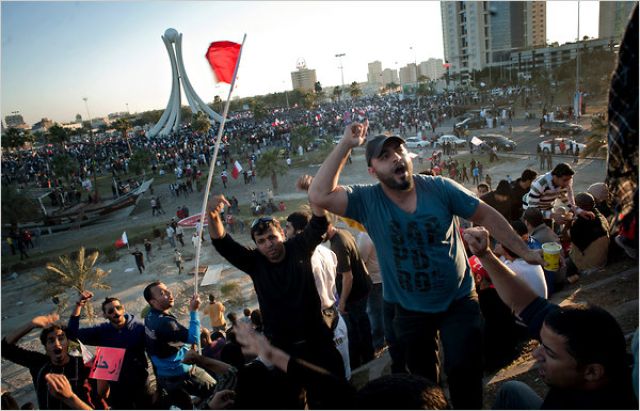
The pro-democracy movement in Bahrain has been severely weakened by the brutal wave of repression that began on March 15.
Attempts to reignite pro-democracy protests have been broken up by government security forces and strikes have been called off.
Troops from Saudi Arabia and the United Arab Emirates entered Bahrain on March 14 to help the Bahraini government “restore order” by attacking thousands of pro-democracy protesters.
The protests started with calls for reform, but most protesters began calling for the complete removal of the Khalifah royal family when the government responded with violence.
With Bahrain unable to stop the protests by itself, the Gulf Cooperation Council — which includes US-friendly dictatorships like Saudi Arabia, Oman, Qatar, the UAE and Kuwait — intervened to make sure no protest victory in Bahrain could inspire further protests in other gulf countries.
The April 2 Asia Times Online said two different diplomatic sources confirmed that the US “gave the go-ahead to Saudi Arabia to invade Bahrain and crush the pro-democracy movement … in exchange for a ‘yes’ vote by the Arab League for a no-fly zone over Libya — the main rationale that led to United Nations Security Council resolution 1973”.
In exchange for support for Western intervention justified on grounds of preventing a massacre of pro-democracy forces by a dictator, the US backed the brutal repression of pro-democracy forces by the Bahraini and Saudi dictatorships.
In the face of the violence, moderate opposition group al-Wefaq has dropped some of its previous preconditions for dialogue with the government, the Wall Street Journal said on March 28.
It now limits its conditions to calls for the military to leave the streets and for “key” political prisoners to be released before negotiations could begin.
Any kind of meaningful dialogue appears impossible, however, as most leaders of the opposition have been arrested or are in hiding.
Jadaliyya.com said on March 27: “The Bahraini regime may speak of having ‘cleansed the streets’ and ‘restored order’ all it and its supporters want, but facts on the ground speak a different truth”.
“Innocent citizens and residents of all but a few areas of Bahrain have lived in a state of terror since March 15th, 2011. Far from ‘protecting people’s lives’, police brutality and pro-government thug violence have wreaked havoc on the streets of otherwise peaceful residential neighborhoods.”

The crackdown expanded on March 30, Associated Press said that day, with more arrests. This included prominent blogger and government critic Mahmoud al-Youssef.
In a familiar pattern, security forces raided al-Youssef’s home late at night and took him to an unknown location.
Intimidation has also continued at the Salmaniya Medical Complex, one of the country’s biggest hospitals. It was taken over by security forces when the crackdown began.
Security forces have used hospitals to identify, assault and arrest injured protesters, Human Rights Watch (HRW) said on March 30.
HRW detailed a number of accounts of beatings of injured patients inside hospitals by masked police. It also reported accounts of the arrest of people requiring urgent medical treatment.
Medical staff have also suffered harassment and beatings. Some were arrested for criticising the government during the protests.
Many injured protesters have resorted to treating themselves at home rather than go to hospital.
A video released by PressTV.ir on March 28 also showed security forces looting and vandalising cars.
The US has raised only muted concern at the violence. This is unsurprising as the Bahraini regime is one of its most important allies in the region.
Bahrain’s strategically important location in the Persian Gulf has meant the long-term presence of the US Navy’s fifth fleet and an airbase — allowing the US to project its power in the region.
Jadaliyya.com said: “Far from having solved Bahrain’s problems, it seems more likely that the Bahraini regime’s violent and ruthless attack on over half its civilian population will only exacerbate them.”
On March 19, Jadaliyya said: “Bahraini forces, taking cue from their Saudi counterparts, have also escalated sectarian-based harassment and violence ...
“Bahraini officers are reportedly beating up and holding civilians at checkpoints based on their accent (which indicates their sect). Shi’a neighborhoods have also been singled out for random police and military attacks, and several accusations have been levelled at Bahrain TV for inciting sectarianism and sectarian violence.”
In an attempt to legitimise the crackdown and foreign invasion, the Bahrain government and its supporters have claimed the Shia-dominated protest movement has links to the Shia-led government in Iran and Lebanese political party Hezbollah, AFP said on March 30.
However, Bahrain’s majority has genuine reasons to protest. Apart from living under an undemocratic regime with a reputation for torturing its opponents, Shia Muslim citizens face social and economic discrimination.
Shia, who make up about 70% of citizens, are kept out of jobs in security forces and the public sector in favour of Sunni Muslims and foreign workers.
James Zogby, head of opinion polling firm Zogby International, said in a Counterpunch.org article on March 28 that polls showed “middle class” Bahrainis were under more economic stress than those in Saudi Arabia and the UAE.
“Issues of political reform, concerns with discrimination, and government accountability have now been brought to the fore in Bahrain,” Zogby said. “Meeting economic concerns will not substitute for political reform, but not addressing these economic matters will only make advancing on the political front all the harder.”